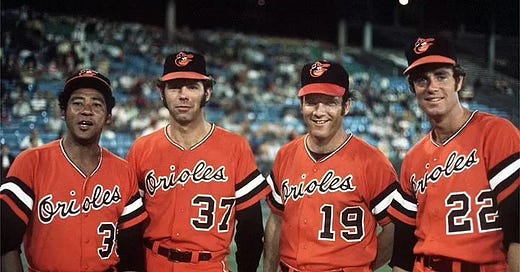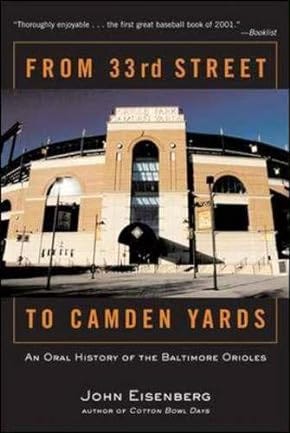Introducing The Bird Tapes
A one-of-a-kind exploration into the history of the Baltimore Orioles.
For more than two decades, I stashed the history of the Baltimore Orioles in a shoebox in my home office closet.
Wedged between a stack of outdated research files and a plastic container filled with junk, the shoebox went unopened year after year, the history inside it untouched.
But that’s about to change.
I’ve opened the shoebox and I’m going to delve deep into Orioles history with a new project I’m really excited about.
OK, let me explain.
A quarter-century ago, in the middle of my long run as a sports columnist at the Baltimore Sun, I took on a side gig and wrote a book about the Orioles titled From 33rd Street to Camden Yards. It was an oral history, an account of the franchise’s four-plus decades to that point as told to me by the players, managers, front office decision-makers, scouts, broadcasters and even a controversial owner, with intermittent written passages by me keeping the narrative going.
It was a thick book, nearly 500 pages long, with chapters detailing such subjects as the careers of legendary players Brooks Robinson, Frank Robinson, Cal Ripken Jr., and many more; the arrival of the team from St. Louis in 1954; the lasting influence of Paul Richards, builder of the franchise’s foundation; the reign of a powerhouse that dominated the American League for nearly two decades; the team’s World Series triumphs and frustrations; the events that brought about the end of the reign in the late 1980s; and the building of a new ballpark in downtown Baltimore that became an instant classic.
To write and publish this epic tale, which ended as the 2000s began, I went on a reportorial journey that, I realize now, was a pure privilege. I interviewed nearly every major figure in Orioles history who was still alive. Brooks, Frank, Cal, Jim Palmer, Eddie Murray, Earl Weaver -- I interviewed them all and many others, including Boog Powell, Paul Blair, Elrod Hendricks, Mike Mussina, Ken Singleton … I could go on.
Aside from the well-known names, my interview subjects included Joe Durham, the first Black player to hit a home run for the Orioles; Ernie Harwell, one of the great baseball broadcasters ever, who was the Orioles’ radio voice in the 1950s; and Steve Dalkowski, an Orioles minor leaguer who was renowned as one of the fastest pitchers in history, but never threw enough strikes to make the majors.
I even interviewed Peter Angelos, the Baltimore attorney who purchased the Orioles in 1993. Angelos, who passed away at age 94 last month, steadfastly declined interview requests from me or just about anyone else from my newspaper, but he spoke to me for the book, which led to a long, liquid lunch in Little Italy during which he artfully defended himself amid the era’s various controversies.
“You should talk publicly more, you’re good at it,” I told him as we parted.
He smiled and went back to declining my interview requests.
Overall, I conducted nearly 90 one-on-one interviews with pillars of Baltimore’s baseball past and present between May 1999 and June 2000.
Inevitably, some conversations took place on the phone. But I sought to do as many as possible in person. I interviewed Weaver over breakfast at his golf club in South Florida. Frank Robinson and I spoke in a press box while we watched an Arizona Fall League game. The chance to interview Steve Barber, a Takoma Park native who was the Orioles’ first 20-game winner, took me to his house near the strip in Las Vegas, where he drove a schoolbus in semi-retirement. Interviews with Palmer, Ripken and many others took place at Oriole Park at Camden Yards.
I taped the in-person interviews on 60-minute microcassette tapes, which slid crisply in and out of a recorder that fit in the palm of my hand. Sometimes, I needed two or three tapes to complete an interview.
Back home, when I finished transcribing a tape, I tossed it in the shoebox in the closet. By the end of the project, I had filled the shoebox with 59 tapes encompassing 42 interviews – truly a one-of-a-kind historical archive.
For the next two decades, I did nothing with it. I had other stuff going on. I wrote other books. I wrote a lot of columns about the Baltimore Ravens. My tape collection gathered dust in the shoebox for so long that, sadly, many of my interview subjects passed away. Meanwhile, microcassettes became audio dinosaurs, rendered extinct by technological improvements.
I began to think I might never do anything with the tapes. But I never got rid of them, and then, during a round of office decluttering last year, I opened the shoebox, gazed at the tapes and experienced a revelation. It was lazy and selfish of me to do nothing with what was, by any measure, a trove of baseball treasure. I needed to get off my rear end and figure out a way to let other people hear these classic voices from the Orioles’ past.
Welcome to The Bird Tapes, a unique exploration of Baltimore baseball history, available only here, on my Substack page.
Think of it as a baseball version of an archaeological dig, the unearthing of rare history. In a few days, I’ll post my first interview from a quarter-century ago. Spoiler: I’m leading off with Brooks Robinson, who spoke to me for two hours when he was in his early 60s and in great health, his mind sharp with observations and vivid recollections ranging from funny to pointed.
I’m biased, but it’s a memorable visit with Robinson, who died last year at age 86.
After that I’ll keep rolling out more interviews in weekly or bi-weekly posts, with Weaver, Harwell, Ripken, Powell, Blair and Frank Robinson among those you’ll hear sooner rather than later. I’ll also supplement the audio with new written material that provides background, biographical info and context. Down the line, depending on how things go, I may add a podcast and new video interviews to the project.
Some of the written posts will be free, available to all subscribers. The interviews will be premium content, available for a modest fee of six dollars a month. Paid subscriptions will help me fund the project, which does have associated costs.
I think the time is right for this in part because the Orioles are celebrating their 70th anniversary in 2024, and that big, round number is coinciding with a major uptick in their on-field fortunes. Led by a slew of young stars, they won 101 games and a division title in 2023 and appeared on the verge of a long run of success reminiscent of their glory years the 1960s and 1970s. That has lured many new fans to their cause, as evidenced by the swell of young people wearing their swag around town.
My goal is to connect what’s happening now to what happened before, because it all exists on the same continuum.
I know longtime fans will relish listening to Brooks, Frank, Earl and others guide them through the team’s first decades in Baltimore, and I also thought some new fans might enjoy learning that life didn’t begin when Adley Rutschman was drafted.
It has taken a small village to start this endeavor and transport these interviews from my shoebox to your earbuds. Fortunately, Gregg Landry, of Towson Transfers and BlueRock Productions, has the expertise to turn interviews on microcassettes into digital files. Jim Bigwood’s audio wizardry is helping make things clearer and more consumable. Anna Gindes is helping me create a brand.
There’s a lot of my voice on these tapes, asking questions and guiding interviews. Hearing myself as a much younger man is, I admit, pretty shocking. But I suppose it reaffirms that I’ve been around the Orioles for a long time – long enough to watch thousands of games, write hundreds of newspaper columns, author two Oriole-themed books, and now, present an audio series.
So here we go. Please subscribe to The Bird Tapes if you’re interested.







Thanks John for sharing all the tapes I've listened to date. I was in 3rd grade in 1964, living in Silver Spring, when I started following the Orioles. The next two decades were amazing! Wondering if one of your future interviews will include Merv Rettenmund? How that guy has never been recognized by the Orioles Hall of Fame is beyond me.
I first heard about your project on Remember When on Sirius XM. I went ahead and suscribed. This morning I went from unpaid to paid and am looking forward to reading this. I'm a long time baseball fan, especially with Kansas City Royals (me being from Kansas.). Anyway my oldest brother was working for WIBW and I would spend a week with him during the summer. Fred White worked for WIBW as well. We would go from Topeka to KC which seemed a couple of nights and each night they were playing Baltimore. It got to a point and I thought Baltimore again, but keep in mind this was in the early 70's. Now I'm looking back and I'm thinking I got to see all those greats play like Brooks Robinson, Frank Robinson, McNally, Cuellar, etc. etc. Now I get to read about them as well. Thanks again!